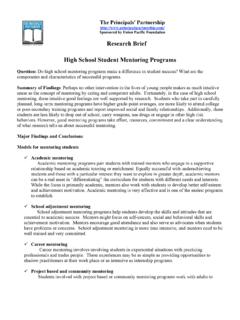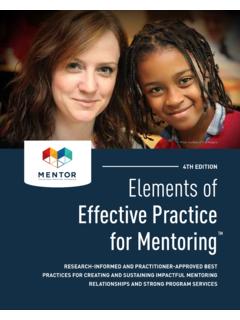Transcription of Mentor Handbook 1 - SAB #BeTheMentor
1 Mentor Handbook 1 What is mentoring ? A Mentor is a wise and trusted friend and guide. mentoring is a structured and trusting relationship that brings young people together with caring individuals who offer guidance, support and encouragement aimed at developing the competence and character of the mentee. Types of mentoring : Traditional mentoring : one adult to one young person Group mentoring : one adult to up to four young people Team mentoring : several adults working with small groups of young people Peer mentoring : caring youth mentoring other youth E- mentoring : mentoring via e-mail and the internet Peer mentors are generally close in age to their mentees for instance siblings or young adults mentoring elementary or middle school pupils. Although peer mentoring often takes place in a natural setting the focus of mentoring is on building a long-term relationship, not on academics. A Peer Mentor Is Friend Coach Companion Supporter Advisor Role model Resource for new ideas and opportunities Person to talk to 2 A Peer Mentor Is Not Social worker Parent Super hero Parole officer Source of money Therapist Solution to all problems Why Peer mentoring ?
2 In general, people take their peers' perspectives very seriously. This means that a positive peer mentoring relationship can have profound effects on a mentee's sense of self-worth. Due to the relationship and similarity in age of peer mentors to their mentees, mentees might also feel more comfortable sharing concerns and problems with their mentors. This increases mentee access to appropriate support and resources during times of struggle. Benefits of Peer mentoring For Mentors Improved reasoning skills Better ability to relate to parents; improved communication skills Greater feeling of connection to the 18+ Community; increased self-esteem, increased empathy Improved conflict resolution skills; greater patience; improved organizational skills Increased cultural capital, which helps mentors to understand their own challenges and experiences 3 For Mentees Increased academic achievement; greater self-efficacy Improved social skills Greater feeling of connection to school and peers; Decreased behavioural problems; lower rate of engaging in risky behaviours Increased school attendance; greater rate of continuing education Great Expectations While it's great to have goals that you and your mentee can work towards, it's important to remember that the purpose of mentoring is to build a relationship.
3 Your primary mission should be to establish trust and to be a supportive role model in your mentee's life. It's also important to keep in mind that the goals you work toward should come from your mentee. If you have goals for your time together, try to focus them on yourself within your role to improve your listening skills, to become solution- oriented, or to be the best Mentor you can be. As a Peer Do To be a positive role model to your mentee The relationship to be one- directional, at least to start Some change to happen To support your mentee in reaching their goals To experience some frustration as a Mentor To be busy To make some impact in your mentee's life 4 Do NOT To reform or save your mentee Your mentee to confide in you or trust you, at least to start Great change quickly Your goals to mirror your mentee's goals for themselves That you will be best-friends-at-first-sight Your mentee to schedule meetings or to develop plans To know about or understand the impact you have made Your Role as a Mentor : Model Behaviour What you do is as important as what you say.
4 Use your behaviour to promote learning and positive development in your mentee. Focus on the Positive Approach challenges from a place of optimism and possibility. Create Learning Experiences Keep an eye out for teachable moments. Take advantage of local resources to cultivate their existing interests. Encourage Help your mentee build self-esteem and self-confidence. A Note On Self-Esteem Self-esteem is a sense of confidence in oneself, and a feeling of connectedness to others. A person's emotional well-being is often built upon their level of self- esteem. Self-esteem is an internal negotiation between our own self-image, our beliefs about how others view us, and the ideal version of the self we would like to 5 be. Building self-esteem is a crucial part of being a peer Mentor . Try to pay attention to your mentee's self-esteem throughout your relationship, particularly when tough issues arise. Signs of Healthy Self-Esteem Enjoys interacting with others/comfortable in social settings Ability to voice discontent without belittling themselves or others Work towards solving issues that arise Generally optimistic Realistic grasp of their own strengths and weaknesses Usually happy and content Can laugh at themselves Makes realistic goals Actively participates in conversation and stands up for what they think Cooperates easily with others Signs of Low Self-Esteem Resistance to change unwilling to try new things Negative self-talk I'm stupid, or I can't do anything right View setbacks as permanent and unchangeable Generally pessimistic Lack of self-confidence and a negative self-image Prone to anxiety and depression Needs constant reassurance Prone to perfectionism Trouble communicating needs and feelings Overly aggressive, trouble sharing 6 The Model Sustaining Transi`oning Enhancing Building All relationships go through stages.
5 The model demonstrates the typical lifecycle of Mentor relationships: building, enhancing, sustaining, and transitioning. These stages are not always clear-cut and frequently overlap. Sometimes, relationships return back to an earlier stage and cycle through more than once. Read on to learn more about each stage individually what it is, what you can expect, and some tools and tips for making the most of the relationship in each stage. Stage One: Building The first stage of the mentoring lifecycle is building the relationship meeting your mentee for the first time, establishing trust, clarifying roles, and agreeing on boundaries are all part of this stage. You and your mentee will both have some anxiety and/or excitement about 7 building this new relationship. Take the initiative to explore mutual interests and find common ground. Because trust is so fragile at this point, it is extremely important to be consistent, authentic, and open-minded. What you do now will set the tone for the rest of the mentoring relationship.
6 Your First Meeting Introduce yourself with confidence and a smile! Learn how to pronounce your mentee's name. Tell your mentee about yourself and ask questions about your mentee. Your mentee may take a while to warm up to you. Be patient, non- judgmental, and open. Remain positive and end on a good note! Stage Two: Enhancing Stage two involves enhancing the mentoring relationship. This means exploring interests in depth, setting goals, and offering yourself as a resource to your mentee. The goals you set can be personal in nature, career-oriented, academics-focused, or anything else that your mentee has in mind. Remember this is a time for your mentee to talk about their ambitions; not an opportunity for you to impose your goals onto them. Stage Three: Sustaining In the third stage of the mentoring relationship, trust has been established and conversation is more comfortable, personal, and open. Working on goals might be a central focus of the relationship.
7 While this new level of comfort is wonderful, it also might come with some new challenges. You and your mentee may struggle to live up to the expectations you agreed to at the start of the relationship. If this happens, you might re-negotiate the terms of your relationship by evaluating what you have accomplished, what new goals you have, and how you would like to work on them together. 8 Stage Four: Transitioning Change can be a scary thing, but they can be made easier by preparing for them. A good way to prepare for relationship transition with your mentee is to talk about it! Celebrate how much you have accomplished, and remind your mentee how much time remains. Part of these discussions should include what you want your relationship to look like once the program ends. No matter when you decide to transition out of the mentoring relationship, be sure to give yourself and your mentee closure. Closure means ending the relationship on a good note, celebrating the time you have spent together, and clarifying your relationship moving forward.
8 Make sure you are both on the same page. Tips for Establishing Trust Trust can be a very difficult thing to establish. Both you and your mentee will bring your own set of expectations, hopes, and experiences to the relationship. All of these things affect the way the relationship will develop, the purpose and goals of the relationship, and the boundaries you and your mentee establish. Consistency is a big part of trust building. Make sure your actions and your words match and that you follow through on commitments. Know that you will get busy. Things will come up. What's important is to be open and honest about your limitations and realistic about your commitments to your mentee. Be a Friend Be your mentee's peer and friend not another authority figure or parent. Listen Try to pick up on your mentee's interests, concerns, and goals through active listening. Don't give advice unless asked first. Mutual Respect 9 Don't impose your beliefs or push your mentee to do things they don't want to do.
9 Know that you are two different individuals. Take a Step Back Make sure your mentee knows that they are the focus. Let them decide what to do, what to talk about, and what goals to work on. Be Supportive Avoid dismissive language like "man up" or "that's not a big deal." Show that you're on their side no matter what. Have their back. Be Yourself Don't put on a role to try and "connect" with your mentee. Being authentic is the best thing to do! Have Fun Resist the urge to be totally focused on goals. Having fun together in the beginning can help you work on more challenging things later. Be Consistent Do what you say you'll do. Follow through. Be present and attentive to your mentee while you are together Be Realistic Don't agree to extravagant requests - things that cost unreasonable amounts of time, money, or effort. Be realistic when setting goals. 10 Be a Friend - Be your mentee's peer and friend not another authority gure or parent. Mutual Respect - Don't impose your beliefs or push your mentee to do things they don't want to do.
10 Know that you are two di erent individuals. Take a Step Back - Listen - Try to pick up Make sure your on your mentee's mentee knows that interests, concerns, they are the focus. and goals through Let them decide what acMve listening. Don't to do, what to talk give advice unless about, and what asked rst. goals to work on. Be Consistent - Do Be Yourself - Don't what you say you'll put on a role to try do. Follow through. and "connect" with Be present and your mentee. Being aTenMve to your authenMc is the best mentee while you are thing to do! together Be SupporMve - Avoid Have Fun - Resist the Be RealisMc - Don't dismissive language urge to be totally agree to extravagant like "man up" or focussed on goals. requests - things that "that's not a big Having fun together cost unreasonable deal." Show that in the beginning can ammounts of Mme, you're on their side help you work on money, or e ort. Be no maTer what. Have more challenging realisMc when seWng their back.





